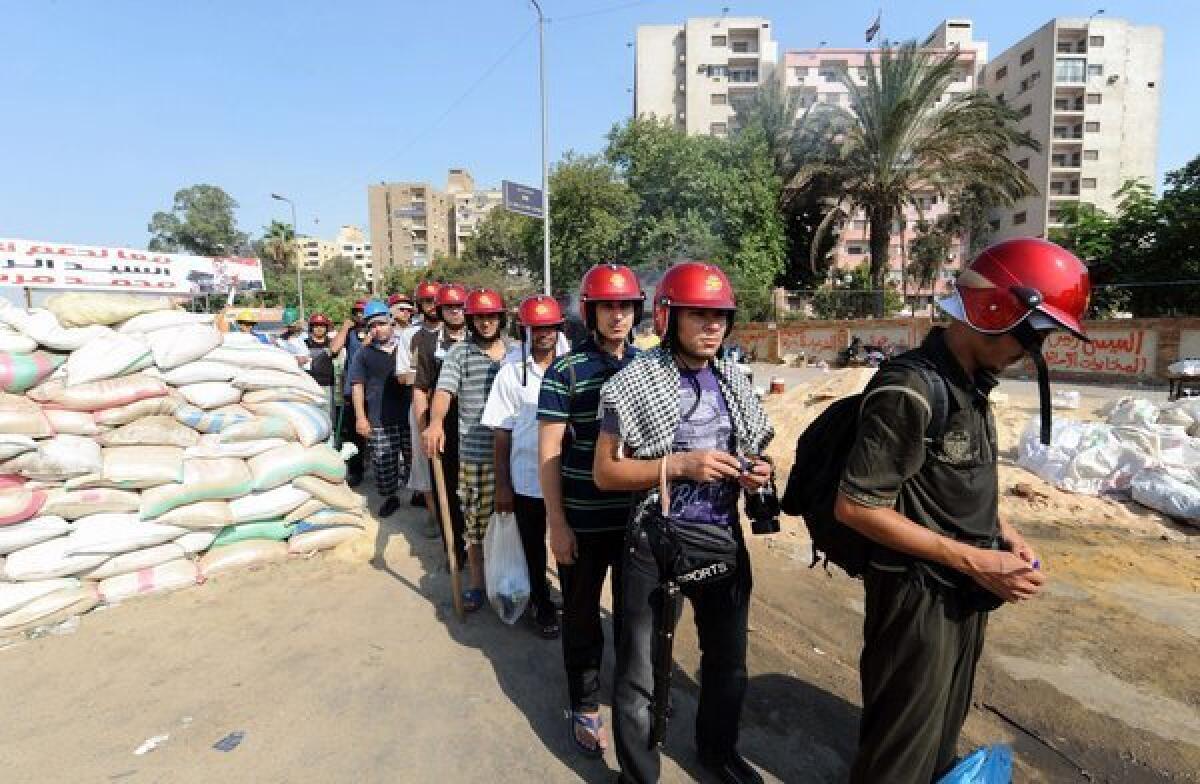Egypt military says protesters use children as human shields

- Share via
CAIRO — Egypt’s military-backed government sought to demonize the Muslim Brotherhood on Friday by accusing the Islamist group of using children as human shields at its rallies against the coup that overthrew President Mohamed Morsi last month.
The accusations were the latest move in a public relations battle between the government and thousands of Morsi supporters who are staging sit-ins at Rabaa Al Adawiya mosque and Cairo University. More than 200 people, mostly Morsi followers, have been killed in clashes with security forces in recent weeks.
A political compromise to end the stand-off remained elusive. Police ordered protesters to leave, but Morsi backers have vowed to stay until he is reinstated.
Human rights groups feared a fresh wave of violence on Friday after police fired tear gas at Morsi followers marching toward a complex of private television stations outside Cairo. The protesters blamed the channels for unfair coverage.
But there were indications that a police crackdown on sit-ins may not be imminent. State television reported that police would gradually encircle the sit-in at Rabaa. “The idea of storming the camp by force is one rejected by the Interior Ministry, but a blockade will be imposed in all the streets leading to Rabaa,” it said.
The Interior Ministry later denied it was planning to close roads leading to the mosque. Around the same time, government officials and childrens rights advocates told reporters the Brotherhood was in “dangerous violation” of international charters by using children as human shields and exploiting them to take part in anti-government rallies.
The Brotherhood is “planting hatred and violence inside our children,” said Nasser El Sayed, secretary general of the National Council for Childhood and Motherhood. He added that children should be “cultivated to love the nation, its cabinet, army and police.”
The interim government has been at odds over how to persuade thousands of protesters, many of them families, to go home. Rights groups and foreign capitals have been pressuring the police and army to show restraint. Government ministers, including Vice President Mohamed ElBaradei, a Nobel Peace Prize laureate, have called for a peaceful resolution.
[Updated 1:28 p.m. PDT, Aug. 3: “Egypt needs to get back to a new normal, it needs to restore stability, to be able to attract business and put people to work,” U.S. Secretary of State John F. Kerry said on a trip to London. “We will work very, very hard together with others, in order to bring parties together to find a peaceful resolution that grows the democracy and respects the rights of everybody.”]
But Gen. Abdel Fattah Sisi, commander of the armed forces, has said he will not tolerate the Brotherhood’s sit-ins and nightly marches through Cairo and other cities. The military has called Brotherhood followers “terrorists.”
“The Egyptians are a people who created a great civilization and a great history,” said Yasin Bahy, a Morsi supporter at Rabaa. “We have the right to say who will lead us. The military took our president away and stole our votes. This is a real revolution, and we have the right to be here.”
The Brotherhood believes it “can achieve a political victory with a sit-in and by blocking traffic,” said Ashraf El Sherif, a professor of political science at the American University in Cairo. He added the group is looking to “attract more sympathy from people, especially if there are many casualties, if the economic situation deteriorates and if divisions start happening within” the anti-Morsi camp.
Protesters wearing hard hats and carrying sticks guard barricaded entrances to Rabaa, which has grown into a tent city in a densely packed middle-class neighborhood. Clerics curse the government, military helicopters buzz overhead and police wait at the edges with tear gas and rifles.
“This battle will rage on. The Muslim Brotherhood are not going to disappear but will remain here and engaged in this fight for a long time,” said El Sherif, adding that the militant groups in Egypt’s Sinai Peninsula who support Morsi will continue to attack military and police installations.
The struggle is a critical for the once-outlawed Brotherhood, which for more than 80 years was the nation’s most powerful opposition group. After autocrat Hosni Mubarak was overthrown in a 2011 uprising, the Brotherhood won control of parliament and the presidency. But its authoritarian instincts and failure to fix an imploding economy incited massive protests in June that led to a coup.
El Sherif suggested that the Brotherhood, despite a public backlash against it and the recent arrests of its leaders, remains a significant political force that the government will have to deal with if the country is to move forward.
“It will end with compromise because each side will realize the limitations of their power,” said El Sherif. “They will be forced to reach a compromise.”
ALSO:
Syria opens new front in social media war: Instagram
African observers criticize Zimbabwe’s election, won’t reject results
U.S. issues global travel alert, closes embassies over Al Qaeda threat
More to Read
Sign up for Essential California
The most important California stories and recommendations in your inbox every morning.
You may occasionally receive promotional content from the Los Angeles Times.














